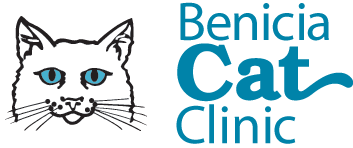
One of the best preventative measures you can take for your cat is to ensure good dental health. We firmly believe that dental disease and dental pain often go undetected by cat owners. Because of an innate survival instinct, cats are able to endure significant discomfort without a noticeable change in appetite or behavior. It is not until a problem is found during an annual exam and then addressed, that most owners recognize that there was a difference in their cat’s behavior before the dental work. This is particularly true if a bad tooth has been discovered and extracted (removed surgically).
Periodontal disease (damage affecting the attachment tissue of the tooth) is a very common problem in the cat. Along with gingivitis (inflammation of the gums) and calculus formation (tartar buildup), it is a major cause of permanent damage to teeth. If left unchecked, these conditions can lead to infection and eventual loss of the teeth involved. Chronic periodontal disease has also been associated with infections in other organ systems, with the kidney and heart being most vulnerable.
At Benicia Cat Clinic we are committed to providing high quality health care. The best way to prevent dental disease is with routine home care, annual physical exams and regular professional cleanings. We recommend yearly dental cleanings and, should your cat need to undergo any extractions during this procedure, we provide a free follow-up consultation.
Of major concern to pet owners is the risk of anesthesia necessary in order to provide adequate dental care for a cat. Here at Benicia Cat Clinic we are very committed to providing safe and comfortable anesthesia to our patients and at an affordable price.
Preanesthetic health screening lab work will be performed on all cases unless declined by the owner and an intravenous catheter is also routinely placed for fluid therapy support while your cat is under anesthesia. Appropriate preanesthetic sedation is provided for optimal patient comfort and relaxation so as to minimize stress and alleviate fear. Closely supervised and careful patient monitoring is provided at all times by trained paraprofessional staff members.

